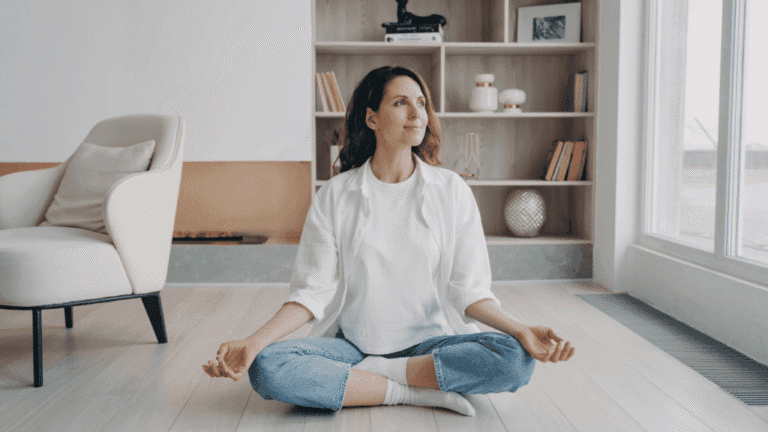Guided Meditation for Beginners Guided Paths Exploring Meditation with Guidance

Guided meditation for beginners, Are you new to meditation and looking for a way to start? Guided meditation is the perfect entry point for beginners like you. It provides gentle guidance and a focal point, making it easier to immerse yourself in the practice and let go of self-judgment. With guided meditation, you can explore the world of mindfulness meditation and experience the many benefits it offers, such as stress relief and improved relaxation techniques.
Key Takeaways:
- Guided meditation for beginners is a powerful tool for beginners to explore meditation.
- It provides gentle instruction and a focal point for easier immersion in the practice.
- Mindfulness meditation offers numerous benefits, including stress relief and improved relaxation techniques.
- By incorporating guided meditation into your daily life, you can experience the transformative power of mindfulness.
- Start your meditation journey today and unlock the inner peace and well-being that guided meditation can bring.
What is Meditation and Why Learn to Meditate?
Meditation is a practice that involves focusing the mind and achieving a deep state of relaxation and awareness. It allows individuals to let go of recurring thoughts and enter a state of calm and inner peace.
Learning to meditate can be beneficial for beginners as it helps improve focus, reduce brain chatter, and lower stress levels. By incorporating meditation into daily life, individuals can experience numerous mental and physical benefits, including reduced anxiety and improved overall well-being.
How to Meditate: A Step-by-Step Guide
To meditate effectively, beginners can follow a simple step-by-step guide:
- Find a calm and quiet place to sit comfortably.
- Set a time limit for your meditation session, starting with shorter durations and gradually increasing as you become more experienced.
- Focus your attention on your breath, following the sensation of inhaling and exhaling.
- When your mind wanders, gently bring your focus back to your breath without judgment.
- Close your meditation session with a moment of reflection and awareness of your thoughts and emotions.
Creating a serene environment is essential for a fulfilling meditation experience. Find a peaceful spot in your home or outdoors, away from distractions. Settle into a comfortable position, whether sitting on a cushion or chair, and keep your back straight. Allow your body to relax and release any tension.
Beginners may find it helpful to start with shorter meditation sessions, such as 5-10 minutes, and gradually increase the duration as they become more comfortable. Consistency is key, so aim to practice meditation daily to establish a habit.
Focus your attention on your breath, observing the rhythm of each inhalation and exhalation. Allow your breath to guide your focus, bringing a sense of peacefulness and grounding. If your mind starts to wander, gently bring your attention back to your breath without judgment or frustration. Remember, meditation is about observing and acknowledging your thoughts, not pushing them away.
To close your meditation session, take a moment to reflect on your thoughts and emotions. Notice any changes or insights that arose during the practice. Allow yourself to embrace the present moment and carry the calmness of meditation into the rest of your day.
“Meditation is the journey of the self, through the self, to the self.” – The Bhagavad Gita
Meditation Techniques for Stress Relief
While the basic meditation guide above provides a solid foundation, there are various techniques you can explore to enhance stress relief and overall well-being:
- Mindfulness Meditation: This technique involves focusing on the present moment, observing your thoughts and sensations without judgment. It cultivates a sense of awareness and acceptance.
- Loving-Kindness Meditation: Also known as Metta meditation, it involves directing loving and compassionate thoughts towards yourself and others, promoting kindness and empathy.
- Transcendental Meditation: This technique utilizes the repetition of specific mantras to transcend to a state of deep relaxation and inner peace.
Exploring different meditation techniques can help you find the one that resonates with you the most. Remember, meditation is a personal practice, and what works for others may not necessarily work for you. Allow yourself to embrace experimentation and find the technique that brings you the most stress relief and serenity.
| Meditation Techniques | Description |
|---|---|
| Mindfulness Meditation | Focuses on the present moment, observing thoughts and sensations without judgment. |
| Loving-Kindness Meditation | Directs loving and compassionate thoughts towards oneself and others, promoting kindness and empathy. |
| Transcendental Meditation | Utilizes the repetition of mantras to achieve a deep state of relaxation and inner peace. |
By incorporating meditation into your daily routine and exploring different techniques, you can cultivate a sense of calm, reduce stress levels, and enhance overall well-being.
Basic Guided Meditations For Beginners

As beginners embark on their meditation journey, practicing basic meditations can provide a solid foundation. These meditations focus on the fundamental elements of mindfulness, guided visualization, and breathing exercises, ensuring a gentle and accessible entry into the practice. By incorporating these basic meditations into your daily routine, you can cultivate mindfulness, reduce stress, and enhance your overall well-being.
1. Mindful Breathing
One of the simplest yet powerful meditation techniques for beginners is mindful breathing. Find a comfortable position and bring your attention to your breath. Observe the sensation of each inhale and exhale, directing your focus solely on the breath. When distractions arise, gently guide your attention back to the breath, without judgment. Practice this meditation for a few minutes each day, gradually increasing the duration as you become more comfortable.
2. Body Scan
The body scan meditation allows beginners to develop a deeper connection with their physical sensations. Start by bringing your awareness to different parts of your body, from head to toe, releasing any tension or tightness you may feel. As you scan each area, pay attention to the physical sensations, without trying to change or judge them. This meditation helps cultivate a sense of grounding and body awareness.
3. Guided Visualization
Guided visualization is an excellent technique for beginners to engage their imagination and create a mental image of a peaceful place. Close your eyes, take a few deep breaths, and envision a serene and calming environment. It could be a beach, a forest, or any place that brings you comfort. Explore the details of this space, imagining how it looks, smells, and feels. Allow yourself to immerse fully in this visualization, experiencing a profound sense of relaxation and tranquility.
4. Box Breathing
Box breathing is a breathing exercise that helps regulate your breath and induce a state of relaxation. Start by inhaling deeply for a count of four, hold your breath for a count of four, exhale for a count of four, and then hold your breath again for a count of four. Repeat this cycle several times, syncing your breath with the counts. Box breathing can be done at any time throughout the day to bring a sense of calm and grounding.
By incorporating these basic meditations into your daily routine, you can establish a strong foundation for your meditation practice. Experiment with each technique and find what resonates with you the most. Remember, meditation is a journey, and with consistent practice, you’ll gradually deepen your experience and enjoy the numerous benefits it brings.
Beyond the Beginning: Advancing Your Guided Meditation For Beginners Practice

Once beginners have established a regular meditation practice, they can explore more advanced techniques to deepen their experience. This can involve exploring different meditation styles such as mindfulness meditation, loving-kindness meditation, or transcendental meditation. Guided meditation sessions led by experienced teachers can also provide guidance and support for advancing the practice. By continuing to explore and challenge themselves, individuals can unlock new levels of mindfulness and inner peace.
Exploring Different Meditation Styles
As beginners progress in their meditation journey, it’s beneficial to explore different meditation styles to further enhance their practice. Some popular meditation techniques to consider include:
- Mindfulness Meditation: This technique focuses on cultivating present-moment awareness and non-judgmental observation of thoughts and emotions.
- Loving-Kindness Meditation: Also known as metta meditation, this practice involves developing feelings of compassion, love, and kindness towards oneself and others.
- Transcendental Meditation: This technique uses a mantra or repeated word to achieve a state of deep relaxation and transcendent awareness.
By experimenting with these different meditation styles, individuals can find what resonates with them and helps them advance their practice.
Benefiting from Guided Meditation Sessions
Guided meditation sessions led by experienced teachers can offer invaluable guidance and support for advancing your meditation practice. These sessions provide a structured environment where beginners can deepen their understanding of meditation techniques and receive personalized instruction. Through guided meditation, individuals can learn new meditation techniques, explore deeper states of consciousness, and gain insights into their own practice.
“Guided meditation sessions offer a unique opportunity for individuals to tap into the wisdom and expertise of experienced meditation teachers. The guidance provided can help deepen your practice and unlock new levels of mindfulness and inner peace.”
Attending guided meditation sessions can also foster a sense of community among practitioners, providing a supportive network for sharing experiences and insights.
Continuing to Challenge Yourself
To advance your meditation practice, it’s important to continue exploring and challenging yourself. This can involve setting new goals, increasing the duration of your meditation sessions, or incorporating more advanced techniques. By staying committed to your practice and pushing beyond your comfort zone, you can cultivate greater mindfulness and tap into the transformative power of meditation.
Remember, meditation is a personal journey, and each individual’s path may differ. It’s essential to listen to your intuition and adapt your practice to what resonates with you.
Comparison of Different Meditation Styles
| Style | Description | Benefits |
|---|---|---|
| Mindfulness Meditation | Awareness of the present moment and non-judgmental observation of thoughts and emotions | – Increased self-awareness – Reduced stress and anxiety – Improved focus and concentration |
| Loving-Kindness Meditation | Cultivation of compassion, love, and kindness towards oneself and others | – Enhanced feelings of empathy and compassion – Improved relationships and social connections – Increased self-acceptance and self-love |
| Transcendental Meditation | Use of a mantra or repeated word to achieve deep relaxation and transcendent awareness | – Reduced anxiety and stress – Improved clarity of mind – Enhanced spiritual experiences |
By exploring different meditation styles and continuing to challenge yourself, you can advance your meditation practice and unlock new levels of mindfulness and inner peace.
The Benefits of Guided Meditation For Beginners
Guided meditation is a powerful practice that offers numerous benefits for beginners. Whether you’re seeking stress relief, improved relaxation techniques, or increased mindfulness, guided meditation can help you achieve these goals. Through regular practice, you’ll experience a myriad of positive effects on your mental and physical well-being.
One of the key benefits of guided meditation is its ability to reduce stress levels. In today’s fast-paced world, stress has become a common and often overwhelming experience. By engaging in guided meditation, you can create a space of calm and tranquility, allowing stress to melt away. As you focus on the instructions and gentle guidance, your mind becomes more detached from stressful thoughts and worries, promoting a sense of peace and serenity.
“Guided meditation helps individuals relax and find inner calm in today’s hectic world.”
Another advantage of guided meditation is its effectiveness in improving relaxation techniques. During guided meditation sessions, you’ll be guided to release tension and embrace a state of deep relaxation. By following the gentle instructions, you’ll learn to let go of physical and mental stress, allowing your body and mind to unwind. This can have a profound impact on your overall well-being, helping you feel more at ease and revitalized.
“Guided meditation teaches individuals how to relax and recharge for improved well-being.”
Furthermore, guided meditation enhances mindfulness, a state of present-moment awareness. By following the guidance and focusing on your breath or other specific points of attention, you cultivate a heightened sense of mindfulness. This increased awareness enables you to observe your thoughts and emotions without judgment, enhancing your ability to stay focused and centered in the present moment.
| Benefits of Guided Meditation: | |
|---|---|
| 1. Stress relief | Guided meditation offers a refuge from the pressures of daily life, promoting relaxation and calm. |
| 2. Improved relaxation techniques | Guided meditation teaches individuals how to release tension and achieve a state of deep relaxation. |
| 3. Increased mindfulness | Guided meditation enhances present-moment awareness, allowing individuals to stay focused in the here and now. |
Overall, guided meditation provides a supportive and structured environment for beginners. With the assistance of an experienced guide, you can establish a consistent meditation practice and stay motivated on your journey. The benefits of stress relief, improved relaxation techniques, and increased mindfulness are just a few of the rewards you can reap from incorporating guided meditation into your daily life. Start your guided meditation practice today and discover the transformative power it holds for your well-being.
Tips for Successful Meditation
Enhance your meditation practice with these helpful tips:
- Choose a quiet and comfortable space: Find a peaceful environment where you won’t be easily distracted. Create a relaxing atmosphere with soothing music or dim lighting, if desired. This will help you focus and fully engage in your meditation session.
- Set a regular meditation schedule: Consistency is key when it comes to meditation. Select a time that works best for you and commit to a daily practice. Starting with just a few minutes a day and gradually increasing the duration will help you build a habit and reap the benefits of mindfulness meditation.
- Focus on your breath: Use your breath as an anchor to cultivate mindfulness during meditation. Pay attention to the sensation of your breath as you inhale and exhale, allowing it to guide you into a state of relaxation and presence. Whenever your mind wanders, gently bring your focus back to your breath without judgment.
- Practice mindfulness in daily activities: Extend the practice of mindfulness beyond your meditation session. Incorporate mindfulness into your daily activities such as eating, walking, or even washing dishes. By paying attention to the present moment, you can cultivate a greater sense of awareness and reduce stress in your daily life.
- Explore different meditation techniques: Don’t be afraid to experiment with various meditation techniques to find what resonates with you. Whether it’s guided meditation, body scan meditation, or loving-kindness meditation, each technique offers unique benefits. Explore different styles and find what brings you the most peace and tranquility.
- Be patient and kind to yourself: Meditation is a journey that requires patience and self-compassion. Don’t judge yourself for having a busy mind or feeling restless during meditation. Instead, approach the practice with kindness and a gentle mindset. Remember that each meditation session is an opportunity for growth and self-discovery.
“Meditation is the art of focusing one’s awareness and finding inner peace amidst the chaos of life.”
The Science Behind Meditation
| Benefits of Meditation | Scientific Evidence |
|---|---|
| Stress Relief | Multiple studies have shown that regular meditation practice can reduce stress levels and improve overall well-being. Meditation activates the body’s relaxation response, leading to a decrease in stress hormones and a sense of calmness. |
| Mindfulness | Research has demonstrated that mindfulness meditation enhances attention and focus. Regular practice can improve cognitive abilities, increase self-awareness, and promote emotional regulation. |
| Improved Sleep | Studies have found that meditation can improve the quality of sleep by reducing insomnia symptoms and enhancing relaxation. It helps to quiet the mind and create a peaceful mental state, facilitating better sleep patterns. |
| Emotional Well-being | Meditation has been linked to improved emotional well-being, including reduced symptoms of anxiety and depression. It fosters a positive mindset, enhances self-compassion, and cultivates gratitude and happiness. |
Remember, meditation is a personal journey, and everyone’s experience may differ. Experiment with different techniques, be patient with yourself, and enjoy the transformative power of mindfulness meditation.
Conclusion
Guided meditation for beginners is an excellent starting point for beginners looking to explore meditation. By following guided instructions and practicing regularly, individuals can experience the numerous benefits of mindfulness meditation, including stress relief and improved relaxation techniques.
As beginners advance their practice and explore different meditation techniques, they can deepen their connection with themselves and cultivate inner peace and well-being. By incorporating guided meditation into their daily lives, beginners can enhance their focus, reduce brain chatter, and lower stress levels.
Start your meditation journey today and discover the transformative power of guided meditation for beginners. Whether you’re seeking stress relief, improved relaxation techniques, or a deeper understanding of your own mind, guided meditation can help you navigate the path towards mindfulness and inner peace.












